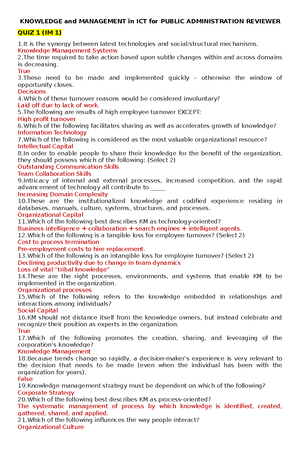- Information
- AI Chat
Was this document helpful?
Politics and Administration Dichotomy
Course: Theory & Practice of Public Administration (PA 56)
458 Documents
Students shared 458 documents in this course
University: Aklan State University
Was this document helpful?

Politics and Administration Dichotomy
At least in the United States, Wilson adjudged public administration as a distinct field
of study and practice. His public administration has been a discipline separate from politics,
his enduring legacy. To Wilson, the field of administration is a field of business and that
administration should be politics-free. Administration should be “removed from the hurry and
strife of politics. It is a part of political life only as the methods of counting the house are a
part of counting society, and that administration lies outside the proper sphere of politics.
Administrative questions are not political questions. Although, politics sets the task for
administrators, it should not be suffered to manipulate its offices.” Thus, Wilson concluded
that politics is a state of activity in things great and universal while administration is the
activity of the state in individual and in small things. Politics thus, is the special province of the
statesman, while administration is the province of the technical official.
At the turn of 19th century, Woodrow Wilson and Frank Goodnow (1900) made
significant studies of the American bureaucratic system.3 Bureaucracy in the United States,
they noted, must work within the framework of a democratic society. But how can
professional civil servants, who are not directly accountable to the electorate, be reconciled
with the goals of democracy? Woodrow and Frank set up the theoretical base that allowed the
political scientists of the century to accept the ideals of democracy together with the efficiency
of a professional civil service. They made a distinction between political (policymaking) and
administrative (enforcement) officials. To ensure that elected officials always run the
democratic system, Goodnow concluded that the political official must always control the
administrative officials. This subordination must be clearly defined on an individual and
agency level. Administration, then, never initiate policy. They merely follow the policy
guidelines laydown for them by the political leaders.
Woodrow Wilson Movement
The political discourse on public administration would not be possible had it not been
to Woodrow Wilson’s study of Public Administration, set the tone of the role of government
and the administration in the civil society, and the improvement they should separately adapt
for successful operation. To Wilson, there should be distinct and separate sphere between
politics and administration, an adage dichotomy. This separation is believed to bring about
solvency in the efficiency and ineffectiveness of government organization or simply
mismanagement. Meanwhile, Woodrow Wilson later become the 28th President of the United
States.
Wilson noted in his classic essay, “it is the object the administrative study to discover,
firstly, what the government can properly and successfully do; and secondly how can it can do





